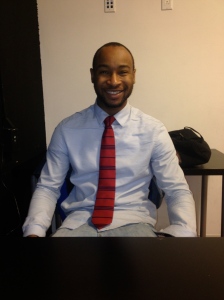I had a very productive meeting with one of my youth advisors today. What made it especially great was that we got to practice skills that were “on the agenda” (how to reach out to strangers over email; how to join groups on LinkedIn), as well as some that were incidental. Here is what Nahjee and I worked on today:
1. Feeling that she is not “bothering” anybody by approaching the front desk
I’ve been noticing that Nahjee had gotten into the habit of texting me whenever she arrived at my office, rather than having the front desk message me. When asked, she explained that she didn’t want to “bother” them. It’s important to me that any youth I invite to my office feels she belongs in this space—and frankly any other space where she would not have the luxury of announcing her arrival by text message.
2. Building a network out of cold contacts
When I switched careers two years ago, and for reasons that still aren’t clear to me, I did not think to tap into my alumni networks the way I did when I explored traditional teaching jobs a couple of years earlier. I reached out to many of my very first contacts as a total stranger. To demystify this process for Nahjee, I gave her print outs of actual emails that I had written (to Priti Kataria and to Betsy Krebs and Paul Pitcoff) and asked her to read them and identify the elements that made the correspondents write back and want to meet me. Nahjee did a stellar job, so I am posting her work with her permission!


As practice, she typed up her own email to reach out to a warm contact. It was fabulous.
3. When being introduced to someone else in the office, make eye contact, shake hands, and smile!
We are still working on this one. 😉 Nahjee isn’t convinced that she can benefit from introductions to “totally random people” that she’ll “never meet again.” I’m going to have to push on this one (but I promise I’ll push gently!).
4. How to join groups on LinkedIn
We’ll see how she balances wanting to join a bunch of groups and not getting overwhelmed by email alerts.
5. Blogging is not the same as writing a research paper or thesis!
[I was just having a conversation about this with another person (ahem) who I know is capable of writing and maintaining a stellar blog.] For now I am giving Nahjee some prompts of topics I am genuinely curious about, and I’m hoping she will feel comfortable enough to share her brilliant insights herself.



